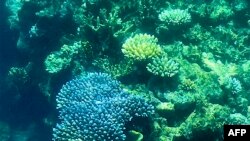Australian scientists say they have developed a special glue that can be used to repair parts of the World Heritage-listed Great Barrier Reef. Researchers at the Queensland University of Technology believe the biodegradable putty has the potential to help the coral recover after it's been damaged by cyclones, hit by boats or suffered bleaching.
The Great Barrier Reef is arguably Australia’s most valuable natural treasure. It is the world's largest coral system and faces an array of threats, including climate change, pollution, over-fishing and coral-eating crown-of-thorns starfish.
When reefs are damaged by cyclones, or struck by boats, patches of rubble are often left behind.
These can be shifted by waves and currents, preventing the formation of a stable seabed that coral needs to grow. Coral bleaching can also cause reefs to disintegrate. When ocean temperatures are too warm - a consequence of climate change - the coral responds to the heat by expelling the algae that give them their brilliant colors and most of their energy. When a coral bleaches, it is not dead, but it becomes far more fragile.
In a bid to reverse some of that degradation, a team at the Queensland University of Technology has made a reef-binding glue that eventually dissolves away.
Leonie Barner is a professor of chemistry at the Queensland University of Technology. She told the Australian Broadcasting Corp. that the glue should be a sustainable way to help reefs recover.
“One component that we are using is actually a plant extract. It's coming from a natural resource, and the other one is a bio-compatible polymer. So, it has no harmful effects on the marine environment. We have tested that in the lab,” said Barner.
However, applying the adhesive putty to large areas is a major challenge. The Great Barrier Reef runs 2,300 kilometers down Australia’s northeastern coast and spans an area about the size of Japan.
Researchers in Queensland hope that underwater robots could eventually be used to help stick broken pieces of Australia’s Great Barrier Reef and other reefs back together.
In the past, researchers tried dropping metal structures and mesh into the ocean to stabilize coral rubble but their use can permanently alter the reef.
Sea trials of the reef-bonding glue are scheduled to start later this month.




